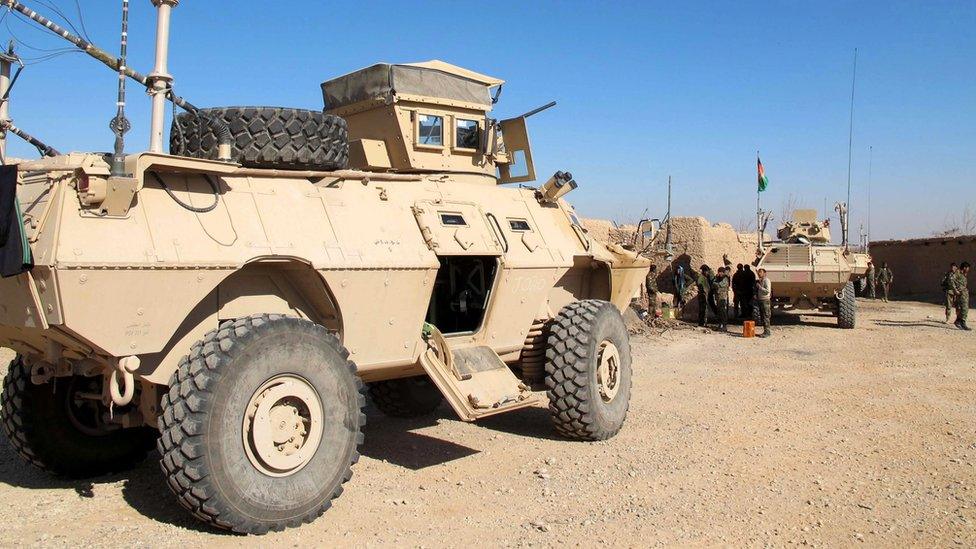Afghanistan Taliban: British military deployed to Helmand
- Published
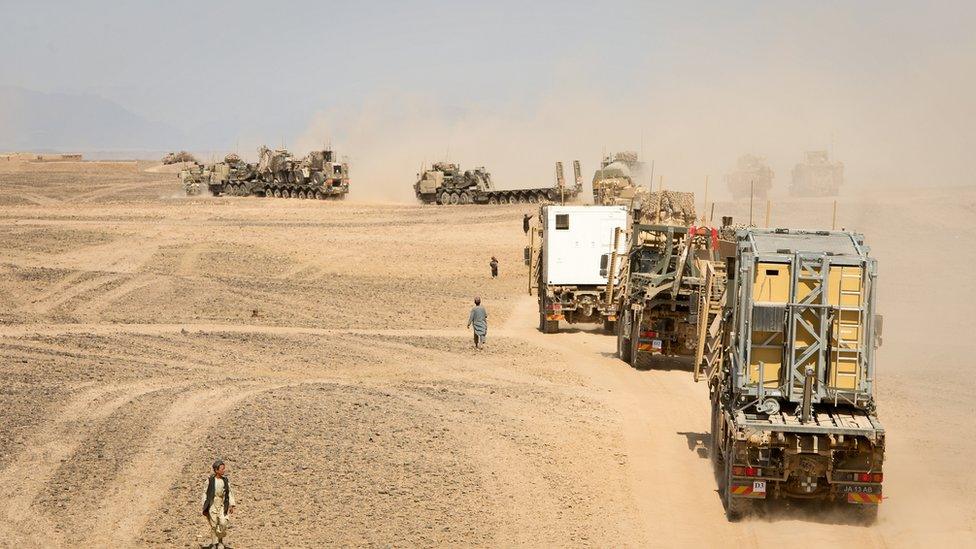
The majority of British troops were withdrawn from Afghanistan in 2014
British military personnel have been deployed to Afghanistan's Helmand province as reports suggest the Taliban is close to overrunning Sangin town.
A small number of personnel had been sent to Camp Shorabak - near the former Camp Bastion - in an "advisory role", the Ministry of Defence said.
They will not be in combat and are part of a larger Nato team, it said.
UK combat operations in Afghanistan ended last year, but about 450 troops remain in mentoring and support roles.
Helmand's governor, Mirza Khan Rahimi, insisted the authorities were still in control of Sangin, in the province, but his own deputy said the town had been overrun by Taliban militants.
The police headquarters reportedly remains under siege after a Taliban attack.
Maj Richard Streatfield, who spent seven months in Sangin in 2009 and 2010 with the Rifles, told the BBC it was "hugely disappointing" to see the town under threat again.
"I won't deny, on a personal level, it does make you wonder - was it worth it?" he said.
"Because if the people we were trying to free Afghanistan from are now able to just take it back within two years, that shows that something went badly wrong at the operational and strategic level."
There are about 10 British personnel now at Camp Shorobak - an army camp some 60 miles by road from Sangin, the BBC understands.
A spokeswoman for the MoD said they would be providing advice to the Afghan National Army as part of the UK's "ongoing contribution" to Nato's Resolute Support mission.
They will not deploy outside the camp, she added.

'Leadership in turmoil'
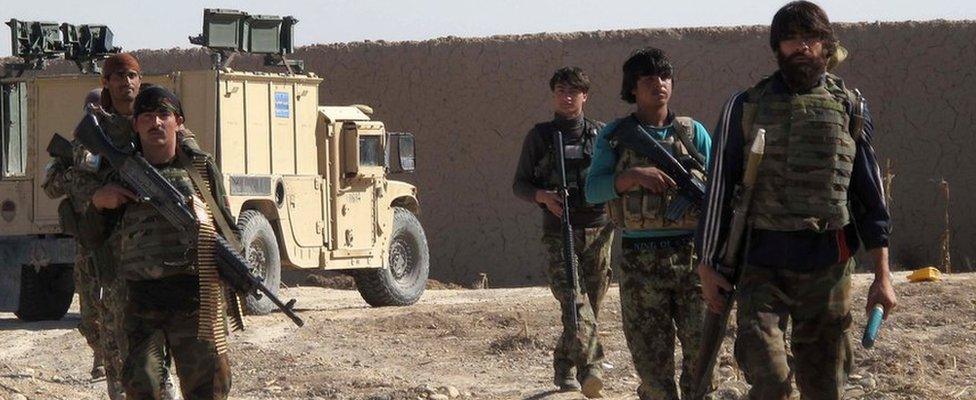
British military personnel have been supporting the Afghan National Army
By Jonathan Marcus, BBC defence correspondent
The Taliban surge, not just in Helmand but in a number of other provinces, has highlighted the dysfunction at the heart of the Afghan government and thrown the continuing problems of the Afghan military into high relief.
The Taliban resurgence is as much a product of the turmoil in its top leadership as anything else, with different factions vying for power and seeking to demonstrate their pre-eminence by displays of military prowess.
The fact that the so-called Islamic State organisation is slowly putting down roots in the turmoil is also worrying Western military planners and adding a new dimension to the Afghan conundrum.

Defence select committee chairman Julian Lewis said British forces must be able to respond more flexibly to extremists in Afghanistan, as well as in Iraq and Syria.
He suggested having a "flexible force which can swoop in and swoop out again, a mixture of special forces supported by air power in support of friendly ground forces where they exist".
The UK, however, should resist getting drawn in permanently to build up a nation in a country that is not ready for it, he told BBC Radio 4's World At One.
Another senior figure, Lord Dannatt - former head of the British Army - said he believed Afghanistan was a lower priority than Syria and Libya, and any upsurge in British military effort should be focused there instead.
Dr Mike Martin, who spent two years in Afghanistan as a British army officer and wrote the book An Intimate War, said the UK should leave Afghanistan alone and not pour money into what he calls a "micro civil war".
Portraying the conflict as the government versus Taliban was "simplistic" when many factors, such as the drugs trade, water, territorial battles, were behind the fighting, he told BBC Radio 4's PM.

Timeline: UK troops in Afghanistan
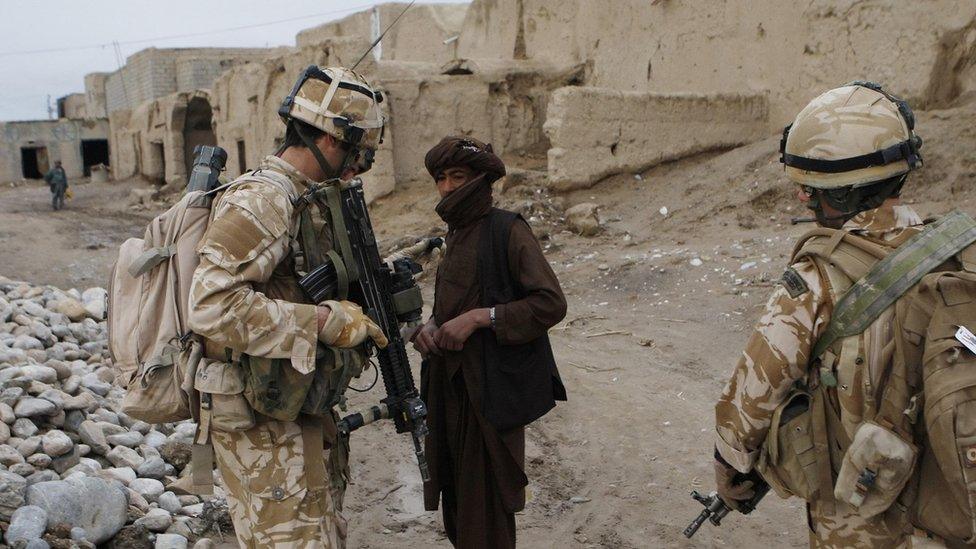
October 2001 - Following the 9/11 attacks, the US accuses the Taliban, the ruling power in Afghanistan, of harbouring terrorist Osama Bin Laden. Britain becomes involved soon after, deploying ground troops
December 2001 - The city of Kandahar, the last Taliban stronghold, falls to US coalition forces. Then Prime Minister Tony Blair hails a victory. Within a year it becomes clear the Taliban has regrouped and is fighting back
January 2006 - More than 3,000 British forces move into the southern Helmand province, with their base at Camp Bastion, as fighting intensifies
October 2009 - The UK sends more troops - at the peak of the conflict there are 9,500 British troops in Afghanistan. Nato and the US also send more troops. It becomes the bloodiest year of the campaign, but the coalition begins to win ground
October 2014 - The last British combat troops withdraw from Afghanistan, after 13 years of combat
December 2015 - A small number of personnel are sent to Camp Shorabak in an "advisory role", working as part of a larger Nato team, the MoD says.

Some 12,000 foreign soldiers are deployed as part of the Nato-led Resolute Support international coalition, which is meant to underpin Afghanistan's own security forces.
On Monday, a Taliban suicide bombing near Bagram killed six US soldiers in one of the deadliest attacks on foreign forces in the country this year.
Nato acknowledged progress in the last year had been "uneven", but said the Afghans were "resilient".
It added that they had become more adept at conducting planned operations and were successfully using helicopters now.
Captain Doug Beattie, who served in Afghanistan, says that failure in Helmand would be “a bitter pill to take"
The battle for Sangin comes a little over a year after the end of UK combat operations in Afghanistan.
More than 450 British personnel died in the conflict, with the heaviest losses suffered in and around Sangin.
Victoria Bateman, whose husband L/Cpl James Bateman was among them, said it almost took her back to the time he died.
If his death had been for nothing, she believed she was owed an explanation, she told the BBC.
Brenda Hale, whose husband Captain Mark Hale was killed in an explosion in Helmand in August 2009, said: "When I'd seen the headline earlier today my breath was snatched away from me.
"Particularly because it's Sangin and especially at Christmas time when families like mine are just trying to get through the holiday with a very empty chair in our house," she told BBC Radio 5 live.
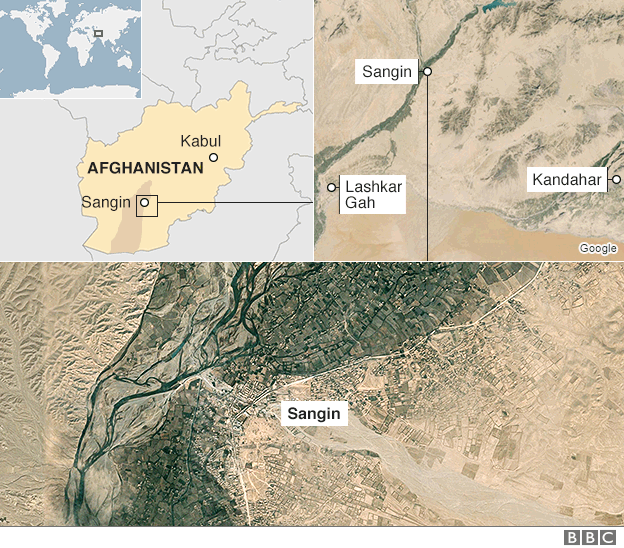
- Published27 October 2014
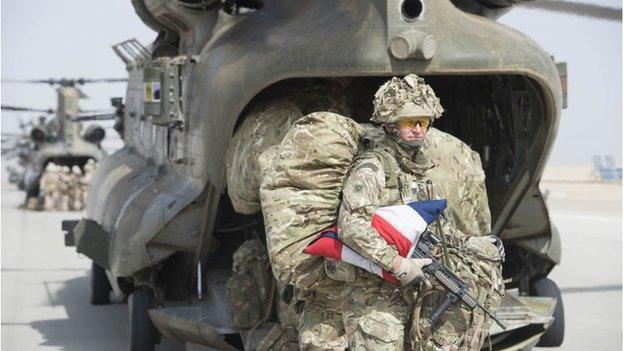
- Published21 December 2015
